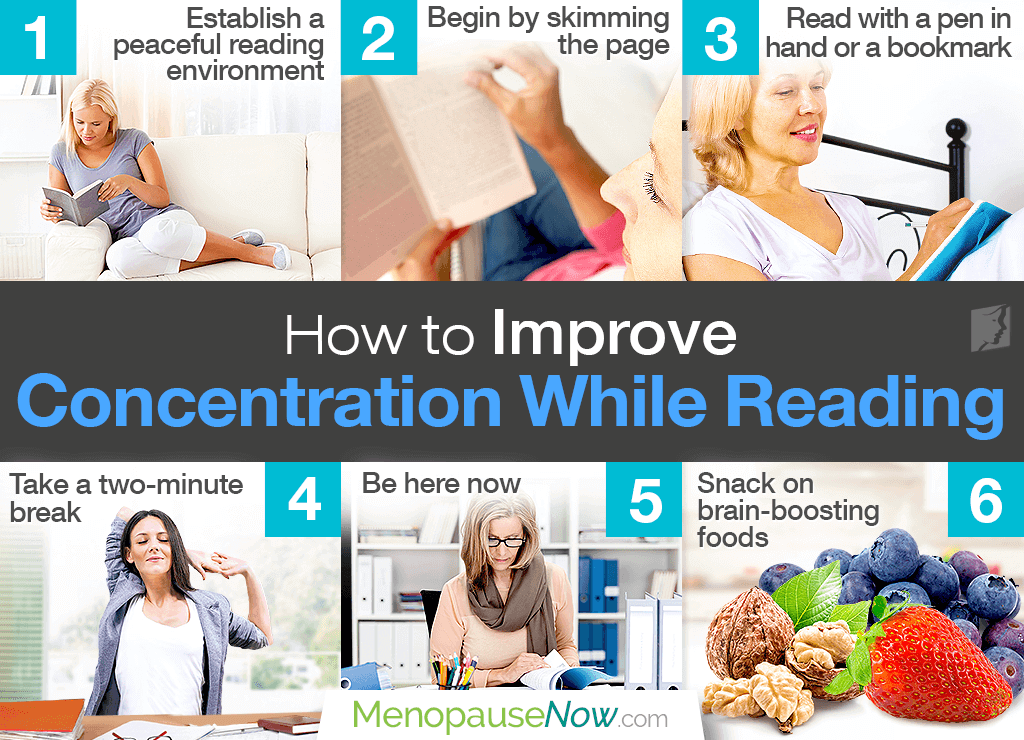Without a doubt, it's frustrating when despite your best efforts to stay focused, the words you're reading won't sink in. Difficulty concentrating is a common complaint of women approaching menopause. This can cause real problems if your job role requires you to read information and can ruin the blissful escapism that a good novel provides.
Continue reading to learn more about difficulty concentrating while reading during menopause and what you can do to reconnect with your literary objectives.
Why It Happens
The drastic hormonal changes that occur during menopause often affect the cognitive functions in the brain, including the ability to process, store, and retrieve information.
During menopause, estrogen levels decrease, which inhibits the production of the cognition-boosting neurotransmitters serotonin, acetylcholine, and norepinephrine. This may cause a woman to experience difficulty concentrating, also known as brain fog.
How to Improve Concentration While Reading
While difficulty concentrating is a common symptom of menopause, this is not to say that it cannot be handled. Like other skills, concentration can be worked on and improved by following some tips:
Establish a peaceful reading environment that is free from distractions. Put your phone away; make sure you are at a comfortable temperature in a well-lit, well-ventilated space, and sit comfortably.
Begin by skimming the page if you are reading for the purpose of obtaining information. Take in titles, subtitles, and highlighted or bold words to get an overview of the text and identify the paragraphs of interest.
Read with a pen in hand or a bookmark. With a pen, you can underline key ideas or words of significance without interrupting the flow of your reading. With a bookmark, you can focus your eyes on the line you are currently reading and keep a good reading pace.
Use a bookmark to focus your eyes on the line you are currently reading and keep a good reading pace, thus preventing them from wandering around the page and re-reading the fragments you have already read.
Take a two-minute break every ten minutes or so to maximize the efficiency of the time you spend actually reading. During these breaks, try getting up to stretch. This will stimulate blood circulation around the body, increasing oxygen flow to your brain to sharpen focus.
Be here now. Whenever you notice your thoughts straying, avoid getting frustrated; simply tell your mind to "be here now" to gently guide your focus back to what you are reading. With practice, this technique will become second nature.
Snack on brain-boosting foods. Some of the best are those that have also been found to protect your heart and blood vessels. Consider grabbing some walnuts or fresh berries, such as strawberries or blueberries.
More Information
When difficulty concentrating inhibits the ability to read as a necessity and a pleasure, it is important to do what you can to sharpen your mind. Therefore, focus on treating hormonal imbalance, the root cause of difficulty concentrating during menopause. With natural and effective treatments for difficulty concentrating, reading needn't be a chore. Get back to reading efficiently and effectively today.
Sources
- Colcombe, S.J. et al. (2006). Aerobic exercise training increases brain volume in aging humans. The Journals of Gerontology, 61(11), 1166-1170. doi: 10.1093/gerona/61.11.1166
- Harvard health Publishing. (n.d.). Foods linked to better brainpower. Retrieved July 12, 2019, from https://www.health.harvard.edu/mind-and-mood/foods-linked-to-better-brainpower
- Kansas State University. (n.d.). Improving Your Concentration. Retrieved July 11, 2019, from https://www.k-state.edu/counseling/topics/career/concentr.html
- National Institute on Aging. (2014). Cognitive training shows staying power. Retrieved July 11, 2019, from https://www.nia.nih.gov/news/cognitive-training-shows-staying-power
- University of New South Wales. (2014). Tips for Effective Reading. Retrieved July 11, 2019, from https://student.unsw.edu.au/effective-reading
- University of Rochester Medical Center. (2012). 'Brain Fog' of Menopause Confirmed. Retrieved July 11, 2019, from https://www.urmc.rochester.edu/news/story/3436/brain-fog-of-menopause-confirmed.aspx




